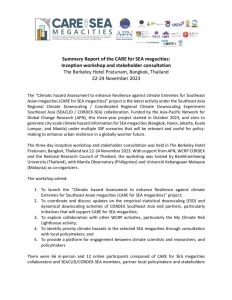In Dhulikhel, Nepal the CORDEX South Asia domain held a workshop 18-20 December, organized by the International Centre for Integrated Mountain Development (ICIMOD). The workshop brought together providers of climate information, academia, as well as research organizations and provided an opportunity to map the use of future climate projection datasets and understand their needs and priorities with the aim to develop a strategy.

It was a hybrid meeting, however most of the 12 participants attended and presented in person. The presentations by the participants provided an overview of the use of future climate projections. One presentation was made online from the Centre for Climate Change Research, IITM – Pune who provided a technical presentation on “the new CORDEX-WAS simulations: Use of high-resolution global modeling for regional climate studies”. The discussions around specified questions gave very useful input towards the development of the strategy.

The workshop provided an opportunity to re-engage with the institutions such as the Department of Hydrology and Meteorology (DHM), Central Department of Hydrology and Meteorology (CDHM), Tribhuvan University which were earlier involved in the institutional capacity building on CORDEX data access and use program. Through interactive sessions, the participants identified the needs and priorities and provided input to develop a regional draft strategy for engagement in the access and use of future climate projections and provision of better tools and services in Nepal. The idea is that this workshop will be followed with similar consultation at a regional level for input into the draft strategy and development of future activities.
More information about the workshop can be found at the website.







